This is a TRUE & SUCCESSFUL story from Jonathan Verrall – Senior SEO Manager at Jellyfish and one of our long time customers.
“ Negative SEO attacks can come in many shapes. Given the latest Google Updates, black hats had to up their game, resorting to all kind of elaborated SEO attacks. In this context, keeping an eye on your backlinks is mandatory, as well as maintaining a healthy link profile. Below, there is a great, in-depth story about a recovery from a negative SEO attack from which much things can be learned and applied. ”
Keeping up with Google’s algorithm updates is challenging. Ironic as it may seem, with developments to the Penguin algorithm in recent years, the very techniques that black hat SEOs had used in the past to build the visibility of their client’s websites are now being used (often by spammers) to bring harm to targeted domains.
Digital marketing agency, Jellyfish, experienced this first hand in the form of a negative SEO attack.
As an established digital agency with reputable competitors we don’t usually receive such attacks, but when our SEO team highlighted our recent drop in organic visibility we soon established it was caused by deliberate, negative SEO tactics.
The SEO data below shows our historical performance on the Jellyfish UK website and the change following the attack – who the actual culprit is, we don’t know. (We did find out what service line they were targeting however, and I’ll share how shortly.)
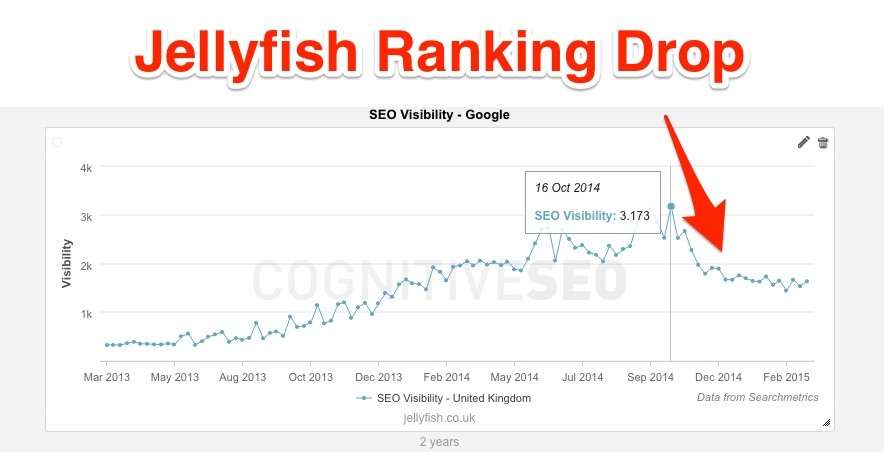
To clarify– we certainly don’t think this was the work of any of our industry peers. The comparative SEO data below is just used to benchmark historical performance and to demonstrate the change following the attack – who the actual culprit is, we don’t know.
So, how was our SEO performance trending over the last 12 months?
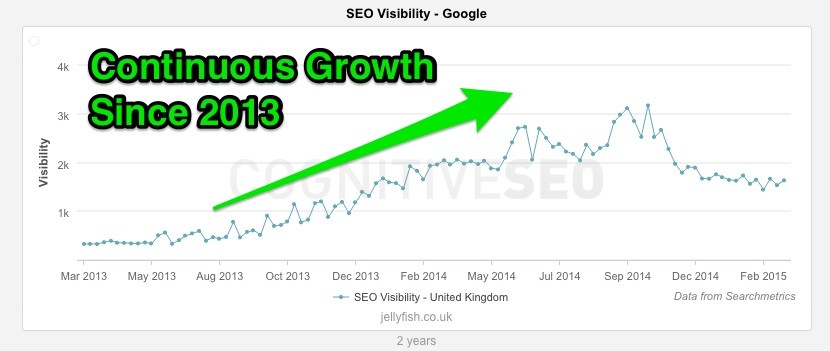
The Jellyfish UK site performance was consistently very strong; steadily increasing throughout 2013 and peaking in October 2014.
We used the Jellyfish Penalty Checker tool to look at the timing of key algorithm updates against our performance and it was evident the Penguin 3.0 update was at the same time (October 17th 2014) as our visibility deterioration:
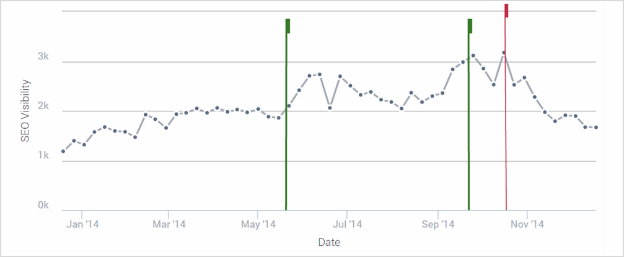
Just to highlight, the Penguin 3.0 update centred on low quality backlinks, and the graph’s trend demonstrates the site’s negatively impacted SEO rank.
Backlink Performance Analysis
Following this finding, we investigated our backlink profile further, and noticed a sudden rush of incoming links throughout October, seemingly out of nowhere. As well as another onslaught of links to our domain in November:
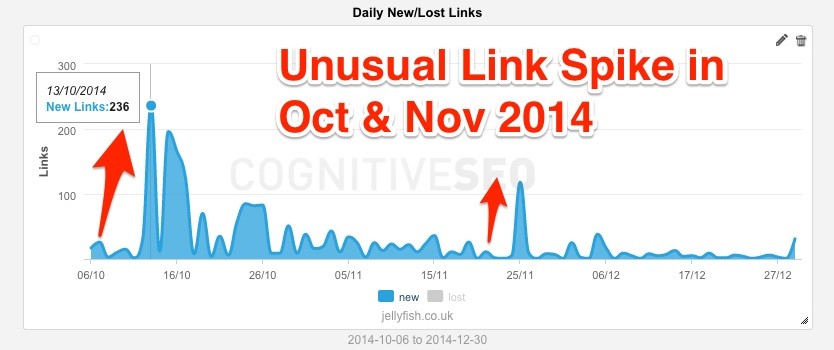
Looking deeper into our backlink profile using CognitiveSEO, we could clearly see their negative value and the effect on our website.
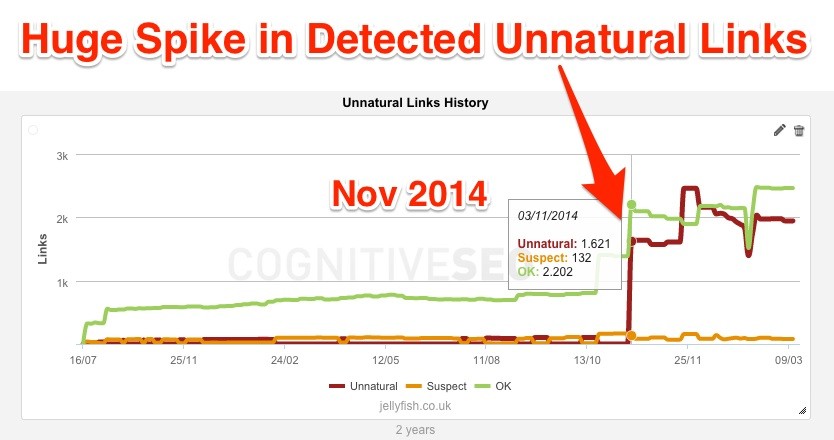
Looking back from August, the data shows imperceptible levels of unnatural and suspect links until….ta-da; October/November, the graph sees nearly 2,000 low quality links suddenly pointing to jellyfish.co.uk.
Over just a week, the health of our website’s backlink profile was systematically undermined from a previously healthy position:
Health of Links in Profile

Further investigation clearly showed a ‘Comment Spamming’ campaign had been underway against our site.
In this instance software had been used to post comments on blogs, automatically, in fast succession, to acquire backlinks.
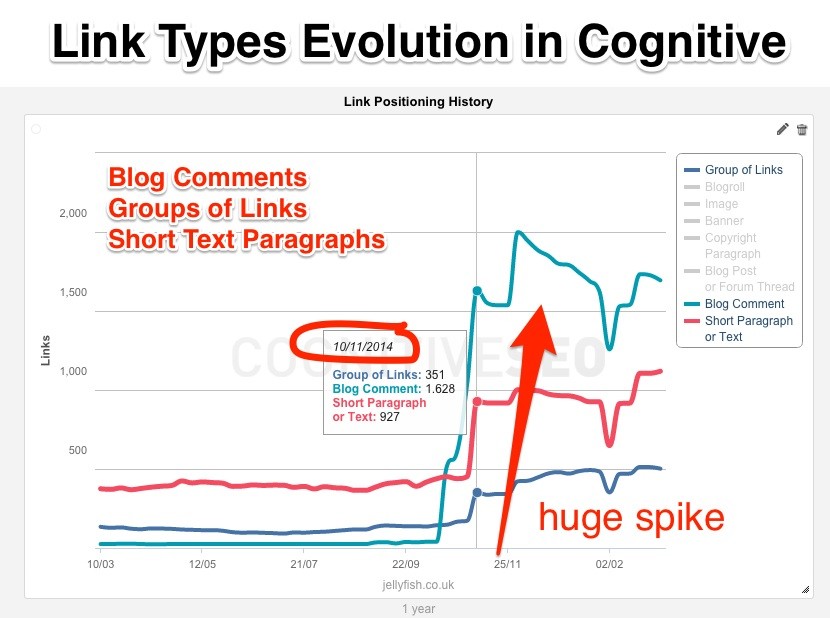
Whilst most comments won’t ever get published, some make it through the net, which is the ‘black hat SEO’s’ aim.
Tracing the Backlinks
To establish the target keywords we used CognitiveSEO to discover that the prime content target was ‘SEO training’:

The exact anchor text used by spammers can be seen here:

Google took the sudden large number of anchor text referring to our page and the pre-existing, and completely legitimate, on-page optimisation as a sign that the page had been over-optimised for ‘SEO training” keyword groups.
Backlink Removal
To remove low quality ‘spammy’ links like these we used several site and web crawling tools, using a number of different ones increased the likelihood that all indexes are covered and minimised the potential of missing any hidden links.
The removal process was twofold, contacting website webmasters and requesting link removal and uploading the remaining bad links to Google Disavow.
Contacting individual webmasters, as you can probably imagine, is very time consuming when there are thousands of links, hence the usefulness of the Disavow tool.
Negative SEO Recovery
As we specialize in SEO, we caught our attack early. All our experts recommend marketers and webmasters monitor your backlink profile regularly; especially if your business is dependent on your website.
The timing of the attack, one month after the October Penguin update, also highlighted this was obviously an ‘attack’ but also that a full recovery will be dependent on the next Penguin update.
To help marketers and webmasters keep abreast of Google updates our Google Penalty Hub has a feature that monitors algorithm updates and their regularity.
Sometimes recovery can take years, like Expedia’s widely reported negative SEO attack that is still affecting this major online brand’s business. Joshua Steimle of aptly said at the time:
“Negative SEO can get companies penalised or entirely banned from Google. It can affect share price. It can even put companies out of business.”
Final thoughts…..Negative SEO attacks are disruptive, malicious and generally a massive pain, but can be tackled, and their effects minimised with swift and decisive action.
Get in touch if you need to know more, and thanks for reading. This story was first reported here.
Disclosure
This is not a paid post and cognitiveSEO didn’t make any kind of agreement with the author. This is the negative seo recovery story of Jonathan Verrall, written and documented by himself.
About the author

Jonathan Verrall
Senior SEO Manager
Jellyfish
As a Senior SEO Manager at Jellyfish, Jonathan is responsible for devising and implementing online visibility strategies, auditing clients sites for optimal organic performance, and ultimately building authority and relevance to his clients sites through a range of link building techniques.

 Site Explorer
Site Explorer Keyword tool
Keyword tool Google Algorithm Changes
Google Algorithm Changes

I thought I’d comment as I’m probably one of the prime suspects of the attack. I promise, it wasn’t me!
I run the SEO training for Zen Optimise who usually sit just behind Jelly Fish for SEO training in the UK.
Firstly, sorry to hear about the attack. That really sucks and not nice at all.
Secondly, it clearly looks like negative SEO although I’m curious of one thing. As far as I am aware (and I may be wrong), Jelly Fish have been #1 for SEO training (and many related terms) in the UK since (and during) the attack. Is that right? And if so, does that mean that the drop in traffic could be for landing pages other than the negatively targeted seo training page?
Joe
Hi Joe,
Haha we’ll take your word for it 😉
You are right in saying that we never actually dropped for the “SEO Training” keywords, this suggests that Google is able to identify an attack on a websites backlink profile.
What is interesting is that we saw the page attract less organic traffic, which indicates we may have lost some of the longer-tailed search to our SEO training page.
We did also notice a drop in performance for other regions of the website which were not targeted with keyword exact match backlinks.
Obviously there are multiple factors at play here, however, the direct correlation to the time of the attack is too clear of a signal to ignore and proposes that the Google search engine considers the health of the backlink profile for the entire domain, (Domain Authority Metrics), when considering the value and importance of specific pages.
You obviously pay close attention to this specific keyword, is this the first time you’ve witnessed dirty play on this landscape?
JV
Pretty weird indeed.
I’ve not seen it as a dirty landscape, everyone seems pretty fair which makes it all the more surprising.
Although we did receive this negative SEO threat in August:
http://searchengineland.com/google-responds-mass-negative-seo-extortion-emails-200689
That one got a lot of publicity from SEOs and I gather the sender of the email got identified and backed down.
As I said before, negative SEO isn’t nice at all and I wouldn’t wish it upon anyone.
I’m an SEO newbie, so I’m confused:
The title of this post included “and their recovery story” but you fail to show any evidence of a recovery; you only showed the steps you took to try to recover.
So how do we know if any of the techniques made a difference? As Joe mentioned, your ranking for the targeted phrase did not change — so how can you consider this a successful attack?
The drop in visibility is site-wide yet the targeted key phrase was unaffected so why would you correlate the two?
Yes I agree with Carlo, what about any recovery? Has organic traffic recovered or are you waiting for Penguin 4, still?
Dangerous attack. I think this kind of things might be done by jealous competitors. At this kind of situations, backlink analysis tools like CognitiveSEO help a lot. Thanks for sharing your amazing story here.
I think that one of this could happend not only from competitor trying to outrank or harm others rankings, sometimes sidebar link from fans can really harm our website.
Negative SEO can be difficult to recover from and reading stuff like this will be very helpful. Thanks for sharing this important information
So how do we know if any of the techniques made a difference? As Joe mentioned, your ranking for the targeted phrase did not change — so how can you consider this a successful attack?
Sometimes negative SEO can happend just from an technical SEO error, like when by mistake you can have lots of pages with noindex, or an error in the disavow files or similar. 1st is important to take care of SEO before pointing to a competitor of trying to cheat. Prevent this issues is crucial and monitor for fixing as quick as possible too.